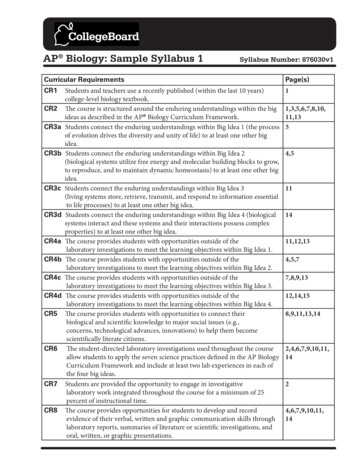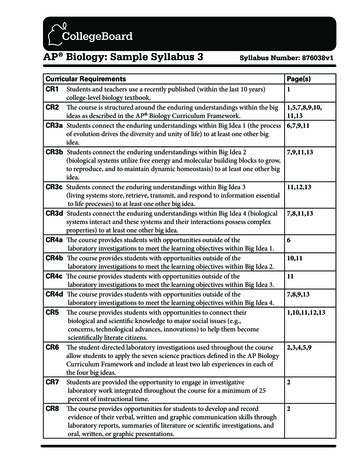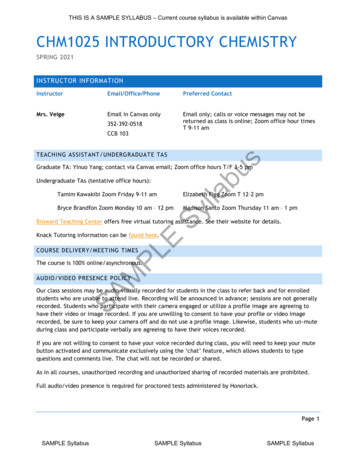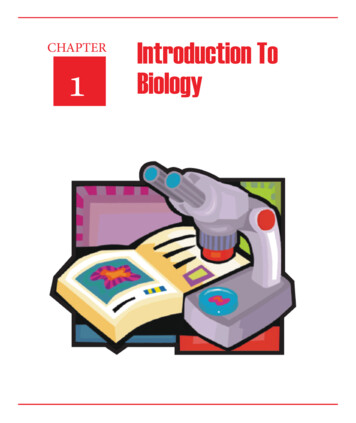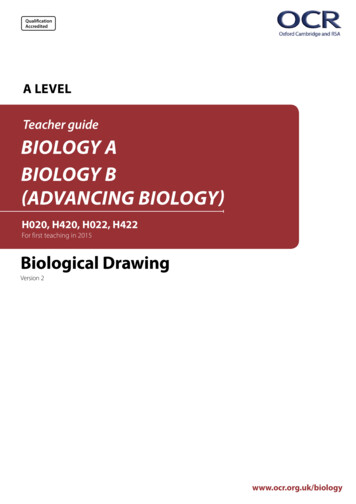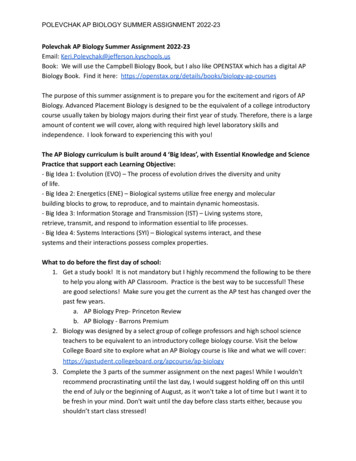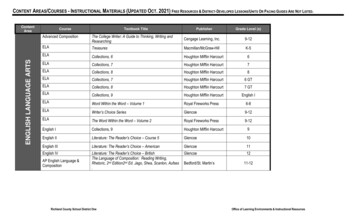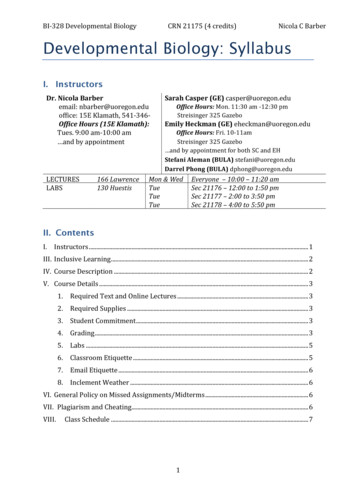
Transcription
BI-328 Developmental BiologyCRN 21175 (4 credits)Nicola C BarberDevelopmental Biology: SyllabusI. InstructorsDr. Nicola Barberemail: nbarber@uoregon.eduoffice: 15E Klamath, 541-346OfficeHours (15E Klamath):7024Tues. 9:00 am-10:00 am and by appointmentLECTURESLABS166 Lawrence130 HuestisSarah Casper (GE) casper@uoregon.eduOffice Hours: Mon. 11:30 am -12:30 pmStreisinger 325 GazeboEmily Heckman (GE) eheckman@uoregon.eduOffice Hours: Fri. 10-11amStreisinger 325 Gazebo and by appointment for both SC and EHStefani Aleman (BULA) stefani@uoregon.eduDarrel Phong (BULA) dphong@uoregon.eduMon & WedTueTueTueEveryone – 10:00 – 11:20 amSec 21176 – 12:00 to 1:50 pmSec 21177 – 2:00 to 3:50 pmSec 21178 – 4:00 to 5:50 pmII. ContentsI. Instructors . 1III. Inclusive Learning . 2IV. Course Description . 2V. Course Details . 31. Required Text and Online Lectures . 32. Required Supplies . 33. Student Commitment . 34. Grading . 35. Labs . 56. Classroom Etiquette . 57. Email Etiquette . 68. Inclement Weather . 6VI. General Policy on Missed Assignments/Midterms . 6VII. Plagiarism and Cheating. 6VIII.Class Schedule . 71
BI-328 Developmental BiologyCRN 21175 (4 credits)Nicola C BarberIII. Inclusive LearningWe aim to build an inclusive learning environment. We understand that our membersrepresent a rich variety of backgrounds and perspectives. We are committed toproviding an atmosphere for learning that respects diversity. While working together tobuild this community we ask all members to: share their unique experiences, values and beliefs be open to the views of others honor the uniqueness of their colleagues appreciate the opportunity that we have to learn from each other value each other’s opinions and communicate in a respectful manner keep confidential discussions that the community has of a personal (orprofessional) natureIf there are aspects of the instruction or design of this course that result inbarriers to your participation, please let us know as early as possible, in person or viaemail. You may also wish to contact Accessible Education Services in 164 Oregon Hall,by phone at (541) 346-1155 or uoaec@uoregon.edu. We welcome the chance to helpyou learn, and will work with you to make it a positive experience.IV. Course DescriptionThe goal of this course is to introduce you to the broad field of developmentalbiology. Developmental biology seeks to address how complex multicellular organismswith diverse forms and cell types arise from single cells. The field spans molecularbiology, genetics, cell biology, ecology and evolution. From these perspectives, we willexplore developmental processes and mechanisms that are shared by many diverseorganisms. We will also consider some human implications of developmental biologyincluding medically relevant disorders and ethical questions related to the field.The course consists of two lectures and one lab per week. Lectures will be taught ina “flipped classroom” approach that necessitates students prepare for class by readingassigned texts and watching online lectures. Classes will then focus on active learningand we will engage in discussions, and delve into interesting problems and ideastogether. Class topics will roughly mirror the organization of the textbook(Developmental Biology by Scott Gilbert and Michael Barresi, 11th ed.). We will beginwith an overview of development, consider the underlying genetics of major steps indevelopment, compare and contrast the early development of several model organisms,explore how germ layers give rise to different parts of the body, and end with someinteresting topics in development. You will also get a hands-on look at some of thedevelopmental processes and model organisms in the lab portion of the class. While theoverall course organization will not change, the content of individual classes and labsmay be modified.2
BI-328 Developmental BiologyCRN 21175 (4 credits)Nicola C BarberV. Course Details1. Required Text and Online LecturesAssigned readings are from the 11th edition of Developmental Biology by ScottGilbert. It is the newest edition, and it therefore might be hard to find used. There willbe two copies available in the science library on reserve. The 6th edition ofDevelopmental Biology is also available online at PubMed Books. Please note that thereare always some differences in page numbers for assigned readings, topic arrangementand current knowledge between editions – especially when dealing with MolecularBiology of Development. Online video lectures that are associated with the text arefreely available through www.devbio.com. It is essential to watch assigned onlinelectures prior to class as class time will be devoted to applying knowledge, solvingproblems and group discussions. Additional readings will be posted to Canvas.2. Required SuppliesiClicker (available in the Duck Store).3. Student CommitmentYou are expected to put in a significant amount of work outside of class per weekreading, watching online lectures, preparing for the lab, completing assignments andstudying for exams (see UO Student Handbook, section Academic Success). Fullattendance and active participation are critical for your success, and will be assessed viaiClicker feedback.4. pation(iClicker)Labs100ExamsTotal240560Point Breakdown16 2-MCQ Canvas “quizzes”worth 8 pts each. 100 pt max.GradePointsA 970-1000A930-969 24 iClicker opportunities at5 points each. 100 pt max.30 pts per lab, lowest scoredropped. Participation (6 pts)and assignments (24 pts).Highest score of 3 methods.See below.A-900-929B 870-899B830-869B-800-829C 770-779C730-769C-700-729D 670-699D600-669F0-59910003
BI-328 Developmental BiologyCRN 21175 (4 credits)Nicola C Barbera) Homework assignments (100 pts):There will be 16 short 2-question homework assignments due before every lecture(except Lecture 1). Assignments for the following week will be available Wed afterclass, and are due immediately prior to the relevant lecture (by 9:59am Mon orWed). They will cover the assigned online lecture and readings that are requiredprior to each class. They will be administered and automatically graded throughCanvas Quizzes and will each consist of two multiple choice questions (MCQ) worth4 pts each. They are “open book” but must be completed individually. The firstquestion will target “lower order” skills based on Bloom’s Taxonomy (remembering,understanding). The second question will target “higher order” skills like applying,analyzing, evaluating or creating. The purpose of these assignments are to ensureyou’re prepared for class and give you an opportunity to practice the range ofmultiple choice questions you will encounter on the exams. Each of the 16assignments is worth 8 pts for a total of 128 pts available. Since these assignmentsare scored out of a max of 100 pts, this allows you to miss some assignments orquestions. There will be no makeup assignments.Image Credit Vanderbilt Center for Teaching -taxonomy/b) iClicker Participation (100 pts)You can earn up to 100 pts for lecture participation, which will be scored usingiClickers. Each click counts as 5pts toward participation. Responses will not bescored for correctness but you may see similar questions in exams, so it is a goodidea to pay attention to them. There will be at least 24 opportunities for clickerparticipation, which will be spread through each lecture and across classes.Responding to at least 20 of 24 clicker questions will earn full credit (100 max ptsavailable) which allows for any missed sessions, iClicker failure etc. Missing iClickeropportunities beyond that - for example by failing to bring your iClicker to class orby not registering your iClicker, will result in a lower participation score.c)Lab Assignments (240 pts)Lab participation and assignments are worth 240 pts of your final grade. Thereare 9 labs (weeks 2-10), each worth 30 points. 6 points for participation and 244
BI-328 Developmental BiologyCRN 21175 (4 credits)Nicola C Barberpoints for the lab assignment that is due at the beginning of the following week’s labsection. The lowest score will be dropped, which will also account for missing a lab.d) Exams (560 pts)There will be two midterms and a final, collectively accounting for 560pts of yourcourse grade. Exams will be cumulative, because concepts will overlap substantiallyover the term, but the focus of each exam will be on material covered since thepreceding exam. Exams can contain materials from class work, assigned onlinelectures, assigned readings, and labs, and will include both multiple choice andopen-ended questions. The exam schedule is listed on the last page. The 560 pointsfor exams will be determined from the highest score derived from 3 methods:Midterm 1Midterm 2Final ExamExams TotalMethod 1160160240560Method 2224 (160 x 1.4)336 (240 x 1.4)560Method 3224 (160 x 1.4)336 (240 x 1.4)560Early or makeup exams will NOT be offered. If you miss a midterm your exam score will bebased on methods 2 or 3.e)No extra creditThere will be no other opportunities for points. Do not ask for exceptions.5. LabsAn important part of learning about Development is to experience some of theprocesses first-hand. This will give you some perspectives about techniques andmethods used to study development and to some extent, how research in the field iscarried out. By using as wide an array of model animals as possible, we will try and giveyou a perspective that is difficult to gain only from reading.Lab sections are held on Tuesdays, starting 2nd week of term and are mandatory.Grading for the lab section of the course will be split between attendance/participation(6pts) and completion of lab assignments (24 pts). Each lab is worth 30 points and thehighest graded 8 of the total 9 labs will count towards your lab grade. You are expectedto follow all safety guidelines and staff instructions. Assignments for each lab will beavailable on Canvas during the preceding week, and should be downloaded, printed, andbrought to the lab section. Completed lab assignments are due at start of your labsection on the following Tuesday. It is extremely difficult to make up for a missed lab byattending another section because section sizes are limited by the Fire Code. If youknow that you are going to miss your lab section, inform your GE at least 24h in advanceand ensure that your preceding week’s assignment is turned in on time or early.6. Classroom EtiquettePlease arrive on time. Lectures and labs begin promptly on the hour. Laptops andother electronic devices are not to be used unless explicitly permitted. Please do notleave early as this is disruptive to everyone. If you have an unusual circumstance and5
BI-328 Developmental BiologyCRN 21175 (4 credits)Nicola C Barbermust leave early, please inform the instructor, and sit near the exit so your leaving is notdisruptive. Finally, please be respectful of your fellow students.7. Email EtiquettePlease include “Bi328” in the subject line, so your email can be attended to in time.We will try to answer your email in a timely manner; however, we do not always checkour email in the evenings or during weekends.8. Inclement WeatherIf road conditions are dangerous, class may be canceled even if the Universityremains open. Cancellation notices specific to BI328 will be posted on the class Canvassite, and university-wide announcements will be posted on the UO home page.VI. General Policy on Missed Assignments/MidtermsAssignments must be turned in on time and there are no early exams or make-upexams. The grading system is designed to allow some flexibility if you miss a midterm orassignment. If you anticipate an extended absence please contact the instructor.VII.Plagiarism and CheatingAcademic Misconduct will not be tolerated. You are expected to do your own workon all assignments and exams. Using another student’s iClicker during class constitutescheating. You are encouraged to discuss ideas with other students and study together,but do not copy someone else’s work or allow anyone to copy yours. All students areexpected to conform to the Student Conduct Code. Please note that Instructors arerequired to file a written report of any academic misconduct with the Director ofStudent Conduct and Community Standards.6
BI-328 Developmental BiologyVIII.Class ScheduleWeekDateVenue1Mon, Jan 9CancelledTues, Jan 10NO LABWed, Jan 11Lecture 1234567891011Mon, Jan 16CRN 21175 (4 credits)TopicOverview of Development and Cell SpecificationNo Class (MLK Jr. Day)Tues, Jan 17Lab 1Cell-Cell CommunicationWed, Jan 18Lecture 2Differential Gene ExpressionMon, Jan 23Lecture 3Cell-Cell Communication and SignalingTues, Jan 24Lab 2Sea Urchin Fertilization and DevelopmentWed, Jan 25Lecture 4Stem CellsMon, Jan 30Lecture 5Gametes and FertilizationTues, Jan 31Lab 3Drosophila Oogenesis IWed, Feb 1EXAMMIDTERM 1Mon, Feb 6Lecture 6Drosophila Development and Axis FormationTues, Feb 7Lab 4Drosophila Oogenesis IIWed, Feb 8Lecture 7Early development invertebratesMon, Feb 13Lecture 8Early development vertebratesTues, Feb 14Lab 5Drosophila Larvae and Gene ExpressionWed, Feb 15Lecture 9Ectoderm – Neural TubeMon, Feb 20Lecture 10Ectoderm – Neural Crest CellsTues, Feb 21Lab 6Zebrafish early developmentWed, Feb 22EXAMMIDTERM 2Mon, Feb 27Lecture 11Mesoderm - SomitesTues, Feb 28Lab 7Zebrafish late developmentWed, Mar 1Lecture 12Mesoderm and endodermMon, Mar 6Lecture 13Limb DevelopmentTues, Mar 7Lab 8Mouse DevelopmentWed, Mar 8Lecture 14Postembryonic developmentMon, Mar 13Lecture 15Evo DevoTues, Mar 14Lab 9Plant development: Form and FunctionWed, Mar 15Lecture 16Development in ContextFri, Mar 24EXAMFINAL EXAMNOTE: Class schedule is not fixed, and lecture topics are subject to change.7Nicola C Barber
office: 15E Klamath, 541-346-7024 Streisinger 325 Gazebo Office Hours (15E Klamath): Emily Heckman (GE) eheckman@uoregon.edu Tues. 9:00 am-10:00 am Office Hours:Fri. 10-11am and by appointment Streisinger 325 Gazebo and by appointment for both SCand EH Stefani Aleman (BULA) stefani@uoregon.edu Darrel Phong (BULA) dphong@uoregon.edu LECTURES


